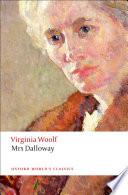Works
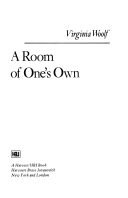
A Room of One's Own
Virginia Woolf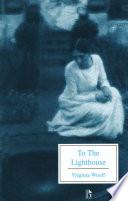
To the Lighthouse
Virginia WoolfJacob's Room
Virginia WoolfThe Common Reader
Virginia Woolf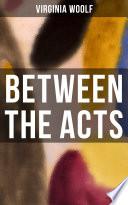
Between the Acts
Virginia Woolf
The Voyage Out
Virginia Woolf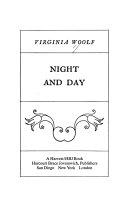
Night and Day
Virginia WoolfThree Guineas
Virginia Woolf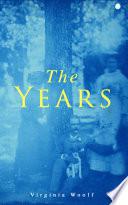
The Years
Virginia Woolf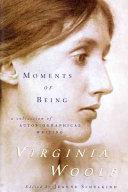
Moments of Being
Virginia Woolf
A Letter to a Young Poet
Virginia Woolf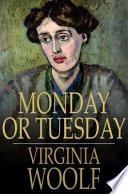
Monday or Tuesday
Virginia WoolfFamous Virginia Woolf Quotes
“No need to hurry. No need to sparkle. No need to be anybody but oneself.”
Source: A Room of One's Own / Three Guineas
“And you wish to be a poet; and you wish to be a lover.”
Source: The Waves
Virginia Woolf Quotes about life
“I have a deeply hidden and inarticulate desire for something beyond the daily life.”
Source: Moments of Being
“Life stand still here, Mrs. Ramsay said.”
Part III, Ch. 3
To the Lighthouse (1927)
Source: Mrs. Dalloway
Context: "Like a work of art," she repeated, looking from her canvas to the drawing-room steps and back again. She must rest for a moment. And, resting, looking from one to the other vaguely, the old question which transversed the sky of the soul perpetually, the vast, the general question which was apt to particularise itself at such moments as these, when she released faculties that had been on the strain, stood over her, paused over her, darkened over her. What is the meaning of life? That was all — a simple question; one that tended to close in on one with years. The great revelation had never come. The great revelation perhaps never did come. Instead there were little daily miracles, illuminations, matches struck unexpectedly in the dark; here was one. This, that, and the other; herself and Charles Tansley and the breaking wave; Mrs. Ramsay bringing them together; Mrs. Ramsay saying, "Life stand still here"; Mrs. Ramsay making of the moment something permanent (as in another sphere Lily herself tried to make of the moment something permanent) — this was of the nature of a revelation. In the midst of chaos there was shape; this eternal passing and flowing (she looked at the cloud going and the leaves shaking) was struck into stability. Life stand still here, Mrs. Ramsay said. "Mrs. Ramsay! Mrs. Ramsay!" she repeated. She owed it all to her.
Virginia Woolf Quotes about people
“If you do not tell the truth about yourself you cannot tell it about other people.”
"The Leaning Tower", lecture delivered to the Workers' Educational Association, Brighton (May 1940)
The Moment and Other Essays (1948)
Virginia Woolf: Trending quotes
Virginia Woolf Quotes
“Books are the mirrors of the soul.”
Source: Between the Acts
Variant: There is no gate, no lock, no bolt that you can set upon the freedom of my mind.
Source: A Room of One's Own (1929), Ch. 4, p. 90

“As long as she thinks of a man, nobody objects to a woman thinking.”
Source: Orlando: A Biography (1928), Ch. 6
Source: Three Guineas (1938), Ch. 3, p. 109
Context: The outsider will say, "in fact, as a woman, I have no country. As a woman I want no country. As a woman my country is the whole world." And if, when reason has said its say, still some obstinate emotion remains, some love of England dropped into a child's ears by the cawing of rooks in an elm tree, by the splash of waves on a beach, or by English voices murmuring nursery rhymes, this drop of pure, if irrational, emotion she will make serve her to give to England first what she desires of peace and freedom for the whole world.
“Melancholy were the sounds on a winter's night.”
Source: Jacob's Room
“It is far harder to kill a phantom than a reality.”
Variant: It is far harder to kill a phantom than a reality
Source: The Death of the Moth and Other Essays
“On the outskirts of every agony sits some observant fellow who points.”
Source: The Waves
The Quote Investigator http://quoteinvestigator.com/tag/virginia-woolf/ traces the origin of such statements to The Intimate Notebooks of George Jean Nathan (1932), where the diarist states:
We were sitting one morning two Summers ago, Ferenc Molnár, Dr. Rudolf Kommer and I, in the little garden of a coffee-house in the Austrian Tyrol. “Your writing?” we asked him. “How do you regard it?” Languidly he readjusted the inevitable monocle to his eye. “Like a whore,” he blandly ventured. “First, I did it for my own pleasure. Then I did it for the pleasure of my friends. And now — I do it for money.”
Misattributed
“A woman must have money and a room of her own if she is to write fiction.”
Source: A Room of One's Own (1929), Ch. 1, p. 4
“The extraordinary woman depends on the ordinary woman.”
"Women and Fiction"
Granite and Rainbow (1958)
Context: The extraordinary woman depends on the ordinary woman. It is only when we know what were the conditions of the average woman's life … it is only when we can measure the way of life and the experience of life made possible to the ordinary woman that we can account for the success or failure of the extraordinary woman as a writer.
“Mrs Dalloway is always giving parties to cover the silence”
Source: Mrs. Dalloway
“And the poem, I think, is only your voice speaking.”
Source: The Waves
Source: A Room of One's Own
“One cannot think well, love well, sleep well, if one has not dined well.”
Source: A Room of One's Own (1929), Ch. 1, p. 18
Context: The human frame being what it is, heart, body and brain all mixed together, and not contained in separate compartments as they will be no doubt in another million years, a good dinner is of great importance to good talk. One cannot think well, love well, sleep well, if one has not dined well.
“All extremes of feeling are allied with madness.”
Source: Orlando
“Examine for a moment an ordinary mind on an ordinary day.”
"Modern Fiction"
The Common Reader (1925)
Context: Examine for a moment an ordinary mind on an ordinary day. The mind receives a myriad impressions — trivial, fantastic, evanescent, or engraved with the sharpness of steel. From all sides they come, an incessant shower of innumerable atoms; and as they fall, as they shape themselves into the life of Monday or Tuesday, the accent falls differently from of old; the moment of importance came not here but there; so that, if a writer were a free man and not a slave, if he could write what he chose, not what he must, if he could base his work upon his own feeling and not upon convention, there would be no plot, no comedy, no tragedy, no love interest or catastrophe in the accepted style, and perhaps not a single button sewn on as the Bond Street tailors would have it. Life is not a series of gig-lamps symmetrically arranged; life is a luminous halo, a semi-transparent envelope surrounding us from the beginning of consciousness to the end. Is it not the task of the novelist to convey this varying, this unknown and uncircumscribed spirit, whatever aberration or complexity it may display, with as little mixture of the alien and external as possible? We are not pleading merely for courage and sincerity; we are suggesting that the proper stuff of fiction is a little other than custom would have us believe it.
“What does the brain matter compared with the heart?”
Source: Mrs. Dalloway
Very often misquoted as "For most of history, Anonymous was a woman."
Variant: Anon, who wrote so many poems without signing them, was often a woman.
Source: A Room of One's Own (1929), Ch. 3, p. 51
“Love, the poet said, is woman's whole existence.”
Source: Orlando
Source: A Room of One's Own (1929), Ch. 2, p. 35
Ch. 3, p. 72) http://books.google.com/books?id=CoP1GxjoNnsC&q="The+history+of+men's+opposition+to+women's+emancipation+is+more+interesting+perhaps+than+the+story+of+that+emancipation+itself"&pg=PA72#v=onepage
Source: A Room of One's Own (1929)
Source: The Letters of Virginia Woolf: Volume Three, 1923-1928
Source: Jacob's Room (1922), Ch. 8
Context: The strange thing about life is that though the nature of it must have been apparent to every one for hundreds of years, no one has left any adequate account of it. The streets of London have their map; but our passions are uncharted. What are you going to meet if you turn this corner?
Source: Orlando: A Biography (1928), Ch. 3
Context: We may take advantage of this pause in the narrative to make certain statements. Orlando had become a woman — there is no denying it. But in every other respect, Orlando remained precisely as he had been. The change of sex, though it altered their future, did nothing whatever to alter their identity. Their faces remained, as their portraits prove, practically the same. His memory — but in future we must, for convention's sake, say 'her' for 'his,' and 'she' for 'he' — her memory then, went back through all the events of her past life without encountering any obstacle. Some slight haziness there may have been, as if a few dark drops had fallen into the clear pool of memory; certain things had become a little dimmed; but that was all. The change seemed to have been accomplished painlessly and completely and in such a way that Orlando herself showed no surprise at it. Many people, taking this into account, and holding that such a change of sex is against nature, have been at great pains to prove (1) that Orlando had always been a woman, (2) that Orlando is at this moment a man. Let biologists and psychologists determine. It is enough for us to state the simple fact; Orlando was a man till the age of thirty; when he became a woman and has remained so ever since.
“His form combined in one the strength of a man and a woman's grace.”
Source: Orlando: A Biography (1928), Ch. 3
Context: The sound of the trumpets died away and Orlando stood stark naked. No human being, since the world began, has ever looked more ravishing. His form combined in one the strength of a man and a woman's grace.


